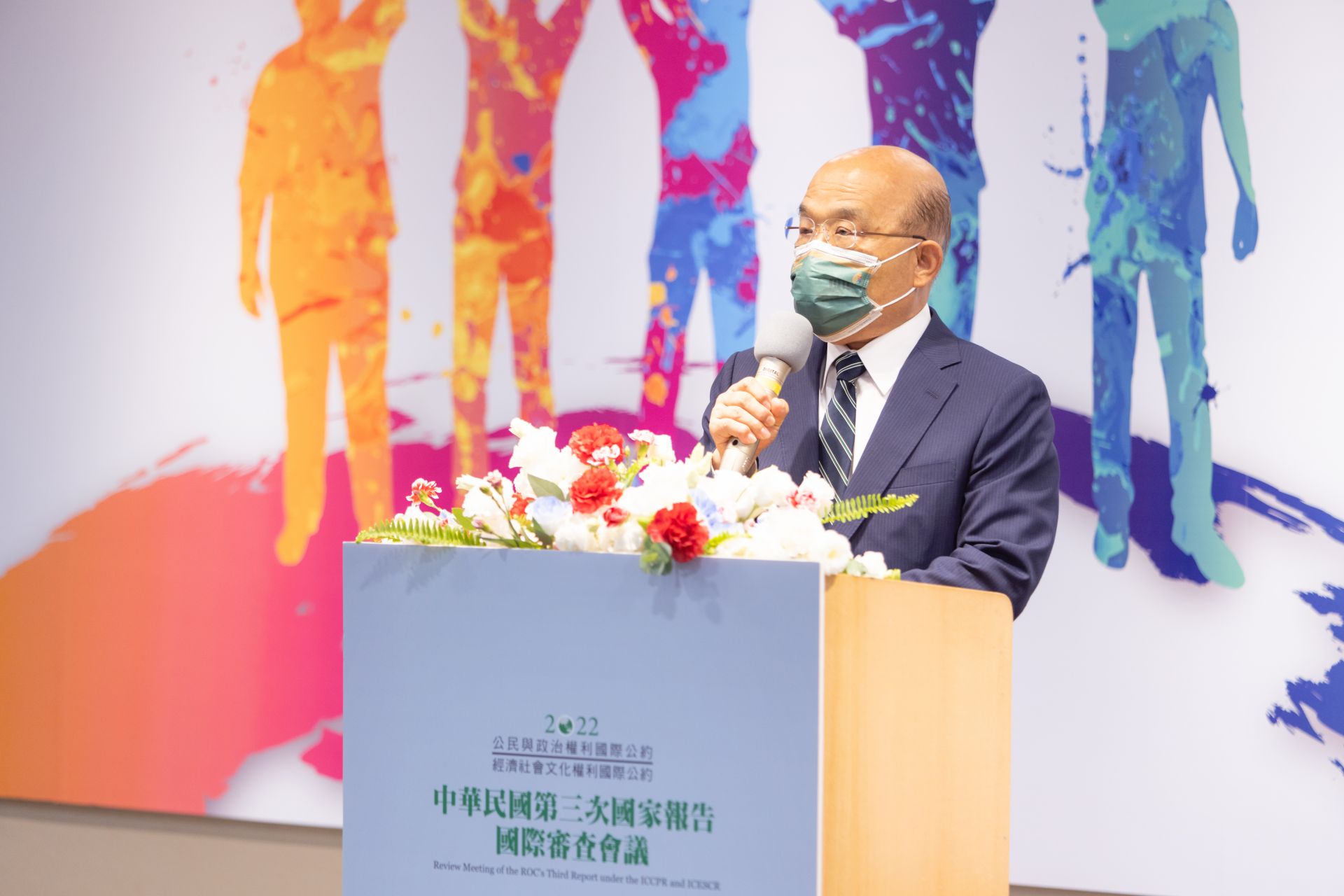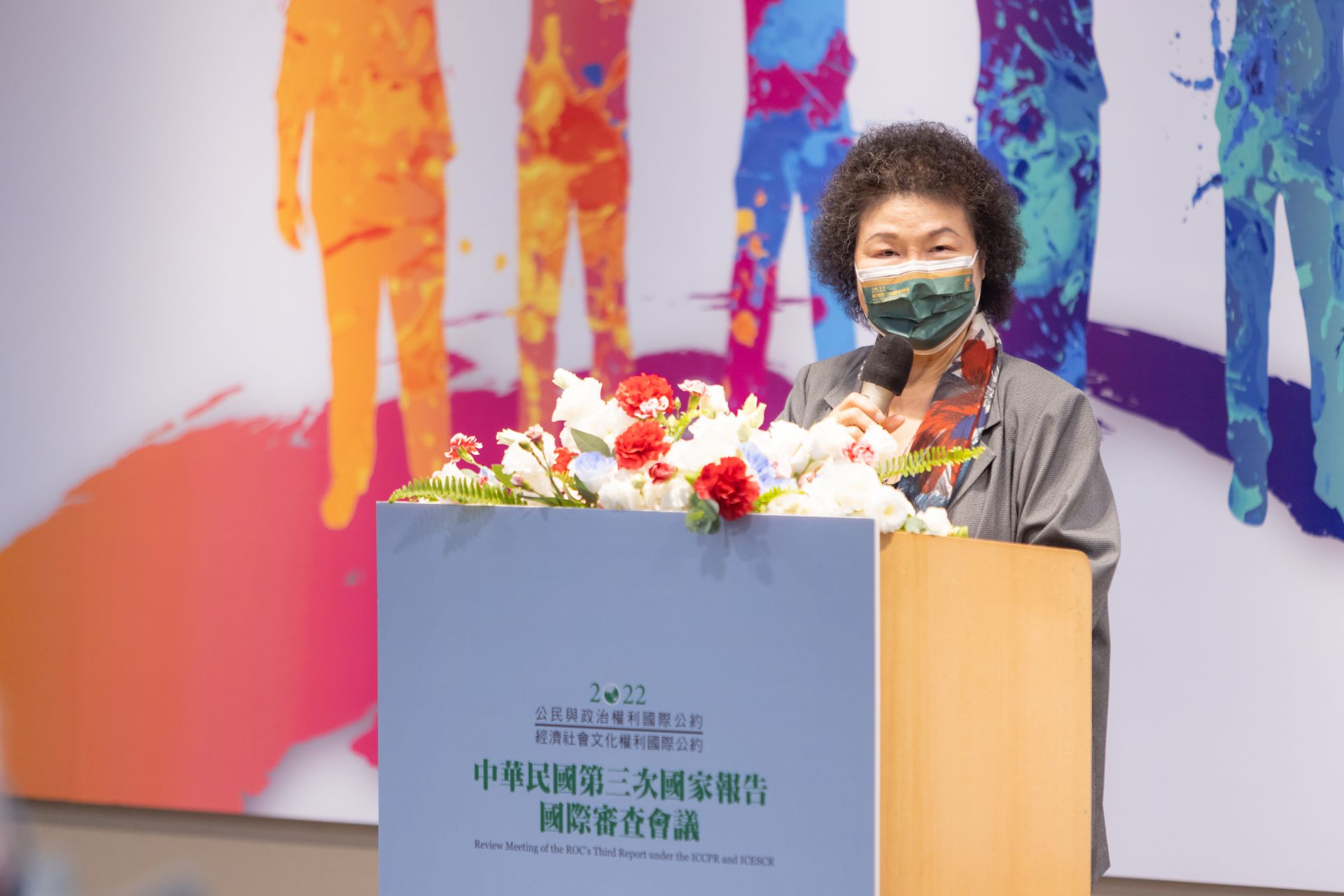新聞發佈
| The Ministry of Justice Press Release |
 | Publication date: May 9th, 2022 Issued by: The Department of Legal Affairs Contact person: Xu Jiayi Contact number: 02-21910189 ext. 2133 No.: |
Review Meeting of the ROC’s Third Report under the ICCPR and ICESCR
International human rights experts visit Taiwan for local review
The Third International Review Conference of Taiwan’s “International Covenant on Civil and Political Rights” (ICCPR) and “International Covenant on Economic, Social and Cultural Rights” (ICESCR) (hereinafter referred to as the two Covenants) was held today (May 9th) at the “Chang Yung-Fa Foundation International Convention Center.” Prominent international human rights experts from Austria, Malaysia, Denmark, Canada, Indonesia, Germany, the Philippines, South Korea, and New Zealand, who have long been involved in United Nations’ human rights protection work arrived in Taiwan for the Third International Review Conference on the two Covenants. The arrival of Premier Su Tseng-chang of the Executive Yuan, Chairperson Chen Chu of the National Human Rights Commission, Minister without Portfolio and Spokesperson Lo Ping-cheng of the Executive Yuan, and Minister Tsai Ching-hsiang of the Ministry of Justice at the morning’s opening ceremony confirmed the significance of the International Review Conference.
In his speech today, President Zhenchang Su of the Executive Yuan mentioned that this year is the third International Review Conference on the National Reports of the Two Covenants. Our government follows international human rights standards and has actively invited international human rights experts to Taiwan to conduct reviews and to provide recommendations. Many of the International Review Committees’ concluding observations and recommendations have been gradually put into practice, such as establishing the National Human Rights Commission in 2020. To improve our human rights monitoring mechanisms, the Commission set up the Human Rights and Transitional Justice Division in the Executive Yuan to promote the country’s policies on human rights and transitional justice, actively encourage the domestic legalization of the nine core international human rights conventions of the United Nations, and gradually build a complete system of human rights in Taiwan. It also released our first “National Human Rights Action Plan” as the guiding principle of Taiwan’s overall human rights policies. In addition, other human rights achievements include the formulation of the “National Action Plan for Enterprises and Human Rights” and the “Action Plan for Fisheries and Human Rights” that propose improvement measures according to the particular situations and needs of individual disadvantaged groups. These actions show that we have taken steps to implement international human rights conventions and our determination to actively participate in international human rights affairs.

In her speech, Chairperson Chen of the National Human Rights Commission pointed out that Taiwan had gone through 38 years of martial law and an arduous democratization process. Furthermore, as we move towards freedom and democracy and global advances in human rights, as the Chairperson of the National Human Rights Commission, it is imperative for Taiwan to implement human rights protection and pursue universal human rights values. Chairperson Chen also added that Taiwan would hold international Review meetings on various national reports this year, such as the Convention on the Rights of Persons with Disabilities (CRPD), the United Nations Convention on the Rights of the Child (CRC), and the Convention on the Elimination of All Forms of Discrimination against Women (CEDAW). Government should adopt an active attitude towards those review meetings on international human rights treaties. If there is still room for improvement in human rights protection, the National Human Rights Commission would be willing to serve as a platform for communication and dialogue between our government and the people and to make assessments and improvements.

Minister Tsai Ching-hsiang is the head of the government agency’s delegation at the International Review Conference. He expressed his gratitude to the International Review Committee members who came to attend this Review Meeting despite the global epidemic. He thanked all the NGOs for their participation and hoped that the Review Conference could serve as a communication platform for government agencies and people. He also hoped to draw on the International Review Committees’ valuable experiences from participating in other UN international human rights affairs to assist Taiwan in resolving various human rights issues and implementing the provisions of the two Covenants to protect human rights. After the meeting, the International Review Committee will refer to relevant United Nations guidelines and put forward Concluding Observations and Recommendations in regards to the Third International Review Meeting. Our government will also use this as a basis to continue to implement democracy, rule of law, and human rights protection.

There are six major highlights in the International Review Conference of the two Conventions, including:
- “Exclusive Youtube live broadcast” - The international review will be broadcasted live with subtitles on its website. In addition to reducing the flow of people at the meeting and minimizing the risk of the epidemic, it can also attract more people and groups interested in this meeting to participate online.
- “From the UN to the world” - This international review conference invites international experts of different nationalities, fields, and from all over the world to Taiwan. A few have served as reviewers since the second Review Conference, including Viginia Bonoan-Dandan, former Chairperson of the UN Committee on Economic, Social and Cultural Rights, as well as former Vice-Chairperson Eibe Riedel; Heisoo Shin, former Vice Chair of United Nations Committee on the Elimination of Discrimination against Women (CEDAW); Manfred Nowak, former United Nations Special Rapporteur on torture and other forms of cruel, inhuman, degrading treatment or punishment; Shanthi Dairiam, founder of the Internationational Women Rights Action Watch Asia Pacific (IWRAW); and retired judge of the European Court of Human Rights, Peer Lorenzen.
- “New members and new issues” - This International Review Conference invited three new international reviewers to present their observations and suggestions on national-level human rights protection mechanisms, international criminal law, and protection of indigenous peoples’ rights and interests. The three members include William Anthony Schabas, a professor of international law and human rights lawyer at Middlesex University in the United Kingdom, Rukka Sombolinggi, the current Secretary General of the Indigenous Peoples Alliance of the Archipelago (AMAN), and Rosslyn Noonan, the former Chair of the UN International Coordinating Committee of National Institutions for the Promotion and Protection of Human Rights.
- “New partnership front” - To meet the requirements of the United Nations’ “Paris Principles” to establish an independent human rights institution, the ROC established the National Human Rights Commission of the Control Yuan in 2020. It also participated in the International Review Conference for the first time, and conducted in-depth discussions with the International Review Committees.
- “More coordinated NGO participation” - NGO groups at home and abroad had actively participated in the previous International Review Conferences under the two Conventions and strived for the opportunity to communicate with the International Review Committees. As a result, the order of speeches was previously determined after numerous discussions and negotiations. However, for this International Review Conference, the order of speeches was decided after just one meeting, which laid a solid foundation for the smooth course of the agenda.
- “New epidemic and new challenges” - Due to the impact of the COVID-19 epidemic, the preparation of this review meeting was more demanding than in the past. During the meeting, the headquarters followed the Central Epidemic Command Center’s epidemic prevention guidelines, with no handshakes, group entry and exit, independent elevators, and other measures to ensure the health and safety of international reviewers and participants.
The two Covenants and the Universal Declaration of Human Rights are the most important human rights instruments of the United Nations, and their implementation is closely related to all people. Therefore, after communicating with government and civil representatives, the International Review Committee will refer to relevant United Nations guidelines and propose a third National Report Review with concluding observations and recommendations to encourage the government in the implementation of human rights protection. This is in hope that Taiwan can once again stand out in the world and demonstrate its determination to build a country based on human rights!
Human rights advancements: https://www.humanrights.moj.gov.tw/
The website dedicated to the review meeting of ROC’s third report under the ICCPR and ICESCR:
https://iccpricescr3rdreviewmeeting.tw/